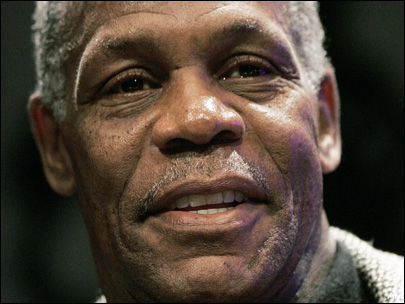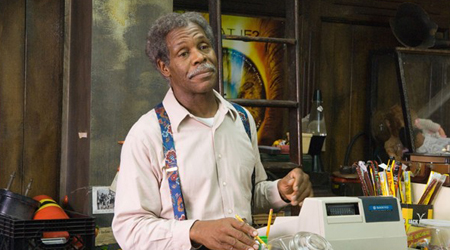Craig here with Take Three. Today: Danny Glover

Over the last decade Glover hasn’t seen the prolonged exposure that he once enjoyed, yet mostly still deserves. But he’s been doing good work in a vast array of projects, both mainstream and arthouse none the less. In a quintet of artful independents The Royal Tenenbaums (2001), Manderlay (2005), Bamako (2006), Honeydripper (2007) and Blindness (2008) he gave strong, varied turns. Barnyard, The Shaggy Dog (both 2006) and Alpha and Omega added family fare to his résumé. A couple of pay-the-rent Saws (first and fifth) and a thankless turn in Death at a Funeral (2010) didn’t harm his career. A couple of presidential engagements, Battle for Terra (2006) and 2012 (2009), kept him afloat. And finally some bona fide solid gold support in Dreamgirls (2006) and Shooter (2007) reminded multiplex audiences just how good he is.
 Take One: Be Kind Rewind (2008)
Take One: Be Kind Rewind (2008)
But the most recent role in which he’s perhaps been most memorable was as the ageing, single, Fats Waller-loving video-shop owner Mr. Fletcher in Michel Gondry’s 2008 comic throwback Be Kind Rewind. He starts out like a kind of reluctant, but good-hearted curmudgeon unwilling to embrace DVD, but he ends up an accidental impresario of both old-school values and new ventures by joining the ranks of the neighbourhood “sweders” to make a community doc on Fats Waller. He typifies both the film’s antiquated side (VHS), but also its embracing of new technologies (DVD, digital) and social connection (people + cinema = growth). The scenes of him trotting off to memorialise Fats and snoop on his rivals would make an endearing film of its own. If Danny Glover could “swede” a film of himself doing just that, I’d be happy.
Two more takes after the jump including the Angry film for which we hope he will be remembered...
 Take Two: Lethal Weapon (1987)
Take Two: Lethal Weapon (1987)
Danny Glover, as long-time staff Sergeant Roger Murtaugh of the LAPD, did say he was “too old for this shit” in Richard Donner’s Lethal Weapon back in 1987. But he couldn’t have been that long in the tooth, all told, because he went on to reprise the role in three sequels. Despite rather, shall we say, diminishing returns as franchises go, the original film made a definitive dent in the Hollywood thriller mould. It was a key film in reminding the world of how entertaining the buddy flick can be when grafted to the cop drama or comedy. It was good cop/badcop crazy cop equation: Gibson was the manic one with a problem history; Glover was the settled one with a family and bills to pay.
The plot’s focus, and Gibson’s star power, ensured the frequency was tuned to Martin Riggs, but Sergeant Murtaugh was no less interesting. Now that Mel’s unhinged onscreen histrionics have faded, we’re left with Danny's arguably better performance. He's more than the sum of the many, many tired wisecracks about his age (Murtaugh’s just turned 50), and the regretfully wizened Glover convinces as an average but family man put to the test. His straightforward, fuss-free performance style, tinted with jovial amiability, was the chief draw of Lethal Weapon’s corny yet entertaining world. I wouldn’t argue with anyone who might say that the sequels required Glover to deliver little more than an extended parody of his original performance, but I’d also contend that he deserved closer attention for the first outing.

Take Three: To Sleep with Anger (1990)
To Sleep with Anger should ideally be the film for which we all remember Glover. though it’s unlikely to be the title that ultimately typifies his career (see Take Two above). Harry Mention is his best role to date. Though Glover doesn't get the most screen time he's the pivotal player. Anger is a domestic drama about a middle-class black family living in South Central Los Angeles. The enigmatic Harry, an old acquaintance of Gideon’s (Paul Butler), visits from the South and causes a series of minor revelations and major upsets: Gideon suffers a stroke; son babe Brother (Richard Brooks) indulges in gambling; Suzie (Mary Alice) is injured. It’s inferred that Harry is more a malicious force – pure evil? the devil? fate? – in the shape of a man, than a straightforward ‘figure from the past’.
Glover exudes a jubilant menace in the role. Watching Anger again -- watching any Charles Burnett film a first, second or even tenth time yields bountiful riches -- it’s evident from his first appearance that this is a unique performance. For one, Glover is entirely comfortable being slyly ambiguous something unseen in other performances of his. We’re never quite sure who Harry is. This is part of Glover’s hazy, voracious charm in the role. He laughs a lot and infectiously over the film’s duration, but there’s always a worrying pause around it. Glover instils Anger with both zest and unease at the same time. It’s a savvy and confident piece of acting.
Three more key roles for the taking: The Color Purple (1985), Predator 2 (1990) The Saint of Fort Washington (1993).